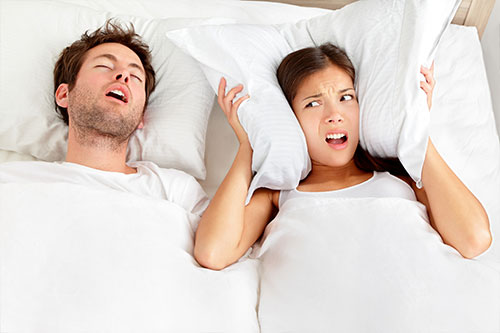Snoring – Does it keep you and your partner awake at night?
Today due to our modern lifestyle, there is a significant increase in the number of people who are obese; and those who are definitely affected by sleep disturbances and snoring. Snoring can be a nuisance to your partner, or anyone else nearby. Sometime it may wake up yourself too if your snoring is loud. If snoring keeps you and your partner awake, please consult an ENT doctor to find a solution for it.

Sleep apnea is a potentially serious disorder in which the abrupt cessation of breathing can cause choking and airway compromise. When the airway becomes completely blocked, there is no breathing for 10-20 seconds, and then the brain senses the apnea and signals to wake up to breathe. This pause in breathing is known as apnea. This process continues hundreds of times throughout the night, the individual experiencing the apnea is not conscious of the problem. Snoring is likely to be one of the signs of sleep apnea when it is followed by silent breathing pauses and choking or gasping sounds. It can also cause dry mouth or throat irritation when you wake up, morning headache, fatigue with mental irritability due to inability to concentrate at work, and excessive daytime sleepiness.
Sleep disorders may disturb the overall quality of life. Sleep Apnea is a serious sleep disorder and a risk factor for heart disease, stroke, diabetes and many other health problems. It can occur in males and females of all ages, obese or Non-obese peoples, but the risk of sleep apnea is higher in overweight people with a body mass index (BMI) of more than 30. Additionally, the size of the neck is also one of the factors which can cause snoring, short neck with excessive fat stores around the neck will restrict the airway and cause loud snoring.
Central sleep apnea occurs because your brain doesn’t send proper signals to the muscles that control your breathing. This causes irregular rhythm of breathing. Sleep apnea may cause the another high risk problem which is sudden cardiac arrest, due to constant lowering of oxygen levels with severely collapsed upper airway which in turn causes delayed awakening of brain response with change of pressure in the lungs. This may be stressing the heart mechanically. Another major side effect of sleep apnea is motor vehicle accident due to excessive day time sleepiness.
As per the airway compromise and metabolic causes, sleep apnea can be classified into three types:
Obstructive Sleep Apnea with loud snoring which is the most common; this is due to the mechanical obstruction and narrowing of the nasal and oropharyngeal airway.
Central Sleep Apnea, which occurs due to the brain not sending proper signals to the muscles that control breathing.
Complex Sleep Apnea syndrome, occurs when someone has a mix of both obstructive sleep apnea and central sleep apnea.
What are the factors causing the Sleep Apnea?
Sleep apnea can occur due to multiple factors which contribute to the airway collapse, the most common factor is mechanical obstruction of nasal passage due to nasal septum deviation, enlarged adenoids, sinonasal polyps, crowded oropharynx with enlarged tonsils, thickened and elongated Uvula with low lying redundant soft palate, large tongue, along with receding mandible and hypopharyngeal collapsing of laryngeal muscles can causing the airway to be narrow and prevent the flow of air in and out of the lungs.
Sleep apnea often affects children too, due to the obstructed airway by enlarged adenoids and tonsils. This causes mouth breathing, restless sleep, bed wetting, recurrent ear infection which may lead to ear drum perforation with chronic ear discharge. If the children are not treated promptly at an earlier age, they will develop disfigured teeth with adenoid face, poor weight gain and lack of concentration in studies.
How to diagnose sleep Apnea?
An expert otolaryngologist and sleep physician can diagnose and treat sleep apnea. At the outpatient clinic sleep apnea evaluation will be done by getting the detailed history and as per the subjective score of Epworth sleepiness scale questionnaire, the condition will be diagnosed that the patient suffers from definite sleep disorder with excessive daytime sleepiness. Both nasal and oro-pharyngeal endoscopic examination can evaluate the mechanical obstruction. By using the Mallampati score technique, grading of the obstruction can be done for further action. Also, Sleep Apnea can be confirmed by radiological images of Computerized CT scans or Dynamic sleep MRI scans.
Sleep apnea is also diagnosed with a sleep study (Nocturnal Polysomnography) carried out at an overnight sleep study in the laboratory or Home sleep study, to assess the grading of sleep apnea and the high risk patients.
What is the solution and treatment for the sleep Apnea?
Ideally life style modifications are the first line of management for Sleep Apnea. Good sleep posture, scheduled sleep time, healthy eating habits and adequate hydration must be followed. Don’t eat a large meal, avoid consuming alcohol before bedtime. Healthy life style following yoga and exercise will also helpful.
Surgical correction will improvise the airway, by reshaping the mechanical obstructions of bone and soft tissue of the nasal and oral passages in the upper airways. Surgery may be a part of the treatment plan for some patients with high risk obstructive sleep apnea with excessive snoring. Surgeries are minimally invasive by using coblation method, which reduce the blood loss and short stay of hospital. Very few will require complex surgeries for multiple level obstructions with gross anatomical variation factors.
Continuous positive airway pressure (CPAP) through the face mask will be suggested for some overweight patients with lower airway obstruction with laryngeal muscle collapses. During sleep wearing a removable oral mandible appliance in mouth is advised mostly for the patients who cannot tolerate facemask with CPAP.
So, if you and your loved ones want to breathe easy and sleep well please treat your symptoms of snoring and sleep disorder at the earliest.

